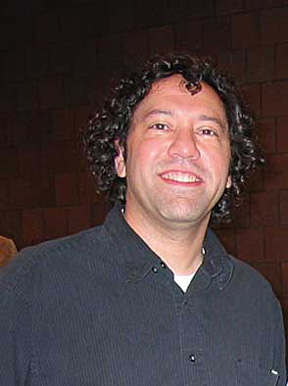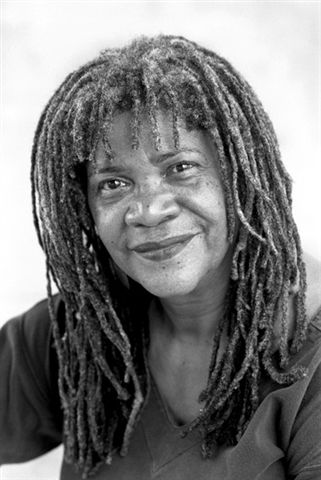The What Light Judges
The readers for this round of the What Light poetry competition were Carolyn Holbrook; Jude Nutter; and Eric Lorberer. Here's a list of the chosen poems and something about who chose them.



Our Poets
Terri Ford, “Poem with Toxic Amphibian,” chosen by Eric Lorberer
Karsten Piper, “To the Future Husband of My Wife,” chosen by Jude Nutter
Amy Levine, “Khorkum at Night,” chosen by Eric Lorberer
Mike Rollin, “Spearthrower,” chosen by Carolyn Holbrook
Greg Watson, “Memo,” chosen by Jude Nutter
Charisse Gendron, “Bumbershoot, Blossom, Boat,” chosen by Eric Lorberer
Mary Kay Rummel, “Deciding to Stay,” chosen by Carolyn Holbrook
Colin McDonald, “Slut,” chosen by Jude Nutter
James Henderson, “37,000 Feet,” chosen by Jude Nutter
Cass Dalglish, “Or Was It Jose Marti?” chosen by Eric Lorberer
Vanessa Ramos, “Creation Story,” chosen by Carolyn Holbrook
Margaret Hasse, “Secrets,” chosen by Carolyn Holbrook
Jude Nutter
Jude Nutter was born in North Yorkshire, England, and grew up in Hohne, northern Germany. Her poems have appeared in numerous journals and anthologies and received several grants and awards, including two Minnesota State Arts Grants, two Blacklock Residencies, the Marlboro Review Prize, the Listowel Writers Week Prize (Ireland), the Robinson Jeffers Tor House Prize, The Marjorie J. Wilson Award for Excellence in Poetry, the Paumanock Award and the International War Poetry Award. Her first full-length collection, Pictures of the Afterlife, was published by Salmon Poetry, Ireland, in 2002; a second collection, The Curator of Silence (University of Notre Dame Press), received the Ernest Sandeen Prize and the 2007 Minnesota Book Award in Poetry. A third collection, I Wish I Had a Heart Like Yours, Walt Whitman, is forthcoming. She has lived in Minneapolis since 1998.
Jude Nutter remarks concerning poetry, “What does poetry mean to me? What is poetry’s function in my life? Well, I tend to look to poetry itself for answers because it’s here, I believe, that we both create and find what we need to sustain us: why else do we write if not to create and assert philosophies that will help us live; to create coherence, and hence meaning, out of disorder?
“As always, poetry itself expresses its own imperative better than any paraphrasing; so, memorize these last two lines from Robert Frost’s poem “Directive” and take them with you everywhere:
Here are your waters and your watering place.
Drink and be whole again beyond confusion.”
Carolyn Holbrook
Carolyn Holbrook is a long-time advocate of arts in education. She founded the Whittier Writers’ Workshop in 1981, was Program Director of the Loft Literary Center from 1989-1993 and founded SASE: The Write Place in 1993. She spearheaded SASE’s merger with Intermedia Arts in 2006. Her work has been strongly focused on keeping the arts accessible and establishing links between various communities. She teaches English and Creative Writing at Hamline University. Her personal essays have been published widely, most recently in White Teachers/Diverse Classrooms (Landsman/Lewis, Stylus Press), Teachers as Collaborative Partners (Tutwiler, Erlbaum Press) and Speakeasy (Loft Literary Center). In 2004, the Twin Cities Women’s Choir commissioned a choral piece based on “I Want to Know My Name,” a chapter from her memoir-in-progress.
She says, about her approach to poetry: “I’m primarily a memoirist but I begin each day by reading a poem, often aloud. The energy, rhythm and light that I receive from reading a good poem carries me through the day.”
Eric Lorberer
Eric Lorberer holds an MFA from the University of Massachusetts and has published dozens of poems in journals ranging from American Poetry Review to Volt. He lives in Minneapolis, where he edits Rain Taxi Review of Books and directs the Twin Cities Book Festival, upcoming this fall at Metro State in downtown Minneapolis. Eric has been a tireless exponent of poetry; Rain Taxi publishes many reviews of poetry books and sponsors readings by remarkable poets in collaboration with such institutions as the Walker Art Center and Magers and Quinn Booksellers.
His statement about his approach to poetry? Eric says, “Poetry needs no statement. Poetry is the statement!”